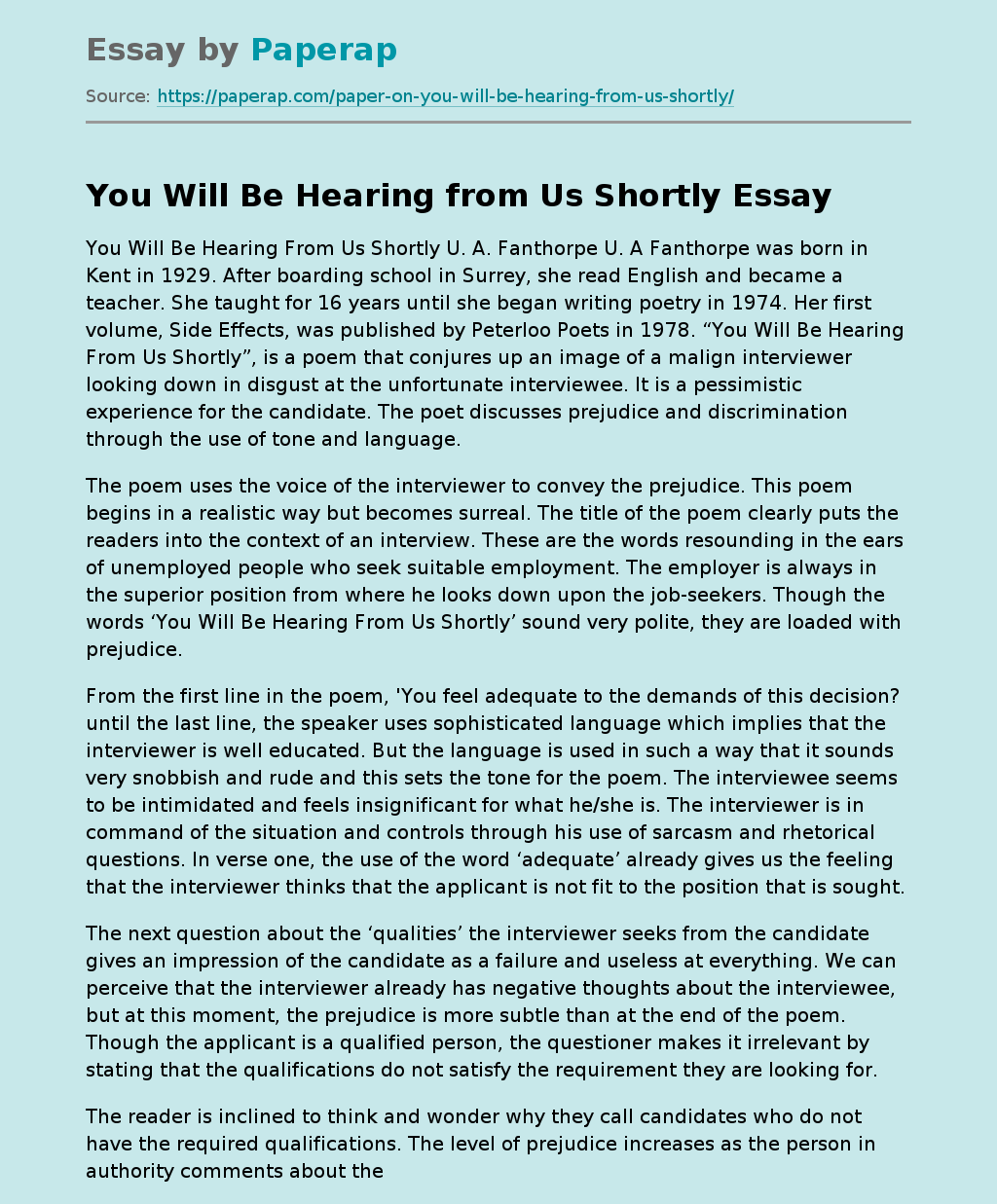You Will Be Hearing from Us Shortly
You Will Be Hearing From Us Shortly U. A. Fanthorpe U. A Fanthorpe was born in Kent in 1929. After boarding school in Surrey, she read English and became a teacher. She taught for 16 years until she began writing poetry in 1974. Her first volume, Side Effects, was published by Peterloo Poets in 1978. “You Will Be Hearing From Us Shortly”, is a poem that conjures up an image of a malign interviewer looking down in disgust at the unfortunate interviewee. It is a pessimistic experience for the candidate.
The poet discusses prejudice and discrimination through the use of tone and language.
The poem uses the voice of the interviewer to convey the prejudice. This poem begins in a realistic way but becomes surreal. The title of the poem clearly puts the readers into the context of an interview. These are the words resounding in the ears of unemployed people who seek suitable employment. The employer is always in the superior position from where he looks down upon the job-seekers.
Though the words ‘You Will Be Hearing From Us Shortly’ sound very polite, they are loaded with prejudice.
From the first line in the poem, ‘You feel adequate to the demands of this decision? until the last line, the speaker uses sophisticated language which implies that the interviewer is well educated. But the language is used in such a way that it sounds very snobbish and rude and this sets the tone for the poem. The interviewee seems to be intimidated and feels insignificant for what he/she is.
The interviewer is in command of the situation and controls through his use of sarcasm and rhetorical questions. In verse one, the use of the word ‘adequate’ already gives us the feeling that the interviewer thinks that the applicant is not fit to the position that is sought.
The next question about the ‘qualities’ the interviewer seeks from the candidate gives an impression of the candidate as a failure and useless at everything. We can perceive that the interviewer already has negative thoughts about the interviewee, but at this moment, the prejudice is more subtle than at the end of the poem. Though the applicant is a qualified person, the questioner makes it irrelevant by stating that the qualifications do not satisfy the requirement they are looking for.
The reader is inclined to think and wonder why they call candidates who do not have the required qualifications. The level of prejudice increases as the person in authority comments about the age and looks of the interviewee. Whether the common people are disturbed or not, the attitude of the interviewer is quite disturbing. He causes further damage to the candidate by breaking the boundaries of social conduct. He asks inappropriate questions regarding the accent, education and the family details.
The height of prejudice and misuse of power comes out when the very existence of the interviewee is questioned. The poem is written in short stanzas followed by a single line, most often by one word; ‘Ah’, ‘Indeed’ etc. this suggests that a conversation has taken place. The language of the speaker is formal and standard English which intimidate the candidate. Lines of varying length are used in order to suit the mood of the speaker, which is controlling and demanding. The use of complex sentences and the first person plural (‘we’) gives the speaker of this poem an air of authority.
Though the responses of the interviewee are not recorded, it is quite understandable what the candidate would have said in reply to the queries made by the interviewer. The alliteration in the words, ‘dubious desire’, domestic disasters’ gives us the clue the extent of degradation the applicant faces. The use of second person pronoun ‘You’ is markedly authorial and its tone is highly dispassionate. First person plural ‘we’ gives the interviewer authority and power.
The speaker’s short statements such as, ‘and your accent,’ and sealed questions, ‘that is the way you have always spoken, is it? represents his ominous rule over the innocent, unlucky interviewee, It leaves the applicant no room or space to argue that there is nothing wrong with his/her accent. Together with the interviewee, the readers sense a feeling of uneasiness at the way the whole interview had proceeded. As we feel pity for the applicant, our mind rebels against the prejudiced interviewer. Every one is sure what it means, when the candidate gets the final statement, “you will be hearing from us shortly”. The answer is not going to be positive.
You Will Be Hearing from Us Shortly. (2018, Jan 01). Retrieved from https://paperap.com/paper-on-you-will-be-hearing-from-us-shortly/

